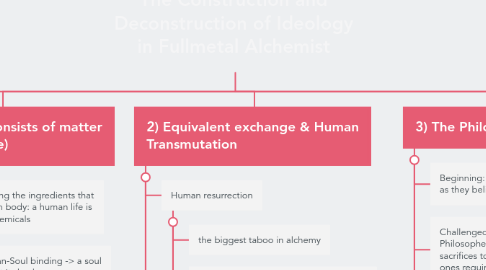
1. Alchemy as an Ideology
1.1. 1) Everything consists only of matter and can therefore be deconstructed and reconstructed
1.2. 2) Alchemy underlies the principle of equivalent exchange, meaning you cannot gain anything without sacrificing something. Therefore, transmutation on humans is strictly forbidden
1.3. 3) The only item that can transcend the principle of equivalent exchange is the Philosopher's Stone
1.4. 4) Since everything consists of matter, a higher being or God does not exist
2. 1) Everything consists of matter (even human life)
2.1. Beginning: Ed listing the ingredients that constitute a human body: a human life is simply made of chemicals
2.2. Challenged: Human-Soul binding -> a soul can survive without its body
2.3. Conflict: Can a human truly be complete without their body? Is there a dichotomy between body and soul?
2.4. Example for analysis: Al and his struggle for identity after his body was taken from him; is he just a puppet that his brother created?
2.5. Result: Ed refutes his previous claims, accepting the humanity and autonomy of his brother despite his lack of body
3. 2) Equivalent exchange & Human Transmutation
3.1. Human resurrection
3.1.1. the biggest taboo in alchemy
3.1.2. attempted by 5 characters: Edward Elric, Alphonse Elric, Izumi Curtis, Van Hohenheim & Roy Mustang
3.1.3. all resurrections failed and resulted in the loss of limbs, organs, bodies, eyesight etc.
3.1.4. But: all characters gain access to The Gate, they get to experience "truth" and are from now on able to perform transmutation without the use of a transmutation cirlce
3.2. Bio transmutation
3.2.1. the creation of new creatures and forms of life through transmutation of humans and animals -> chimera
3.2.2. example: Shou Tucker, who merges his own daughter with the family dog to retain his state alchemist license
3.2.3. example: chimeras being used as special force by the military
3.3. Homunculi
3.3.1. the creation of artificial humans
3.3.2. their "heart" is a Philosopher's Stone -> immortality
3.3.3. genocide is needed to create a single Homunculus
3.4. Beginning: Ed believes that alchemic experimentation is simply a step towards more knowledge
3.5. Challenged: along his journey, Edward experiences the ethical horrors of alchemic experimentation on human life
3.6. Conflict: Can the progression of human technology justify unethical experiments?
4. 3) The Philosopher's Stone
4.1. Beginning: the object of Ed and Al's quest as they believe it can return their bodies
4.2. Challenged: they discover that a Philosopher's Stone requires multiple sacrifices to make, the most powerful ones require genocide
4.3. Example: the entire nation of Xerxes was annihilated in order to create the Philosopher's Stone that bestowed Father with immortality
4.4. Conflict: Should lives be sacrificed to retain others'?
4.5. Result: Ed and Al refuse to use the Philosopher's Stone to return their bodies for ethical reasons; however, during their journey they have no choice but to use it twice and end in deep remorse
5. 4) Alchemy vs. Religion
5.1. The Ishvalian War & Scar
5.1.1. the Ishvali are a deeply religious folk that oppose alchemy
5.1.2. they were decimated in a civil war as they could not withstand the military's powers of alchemy
5.1.3. Scar: an Ishvalian (driven by religion) who seeks revenge on all alchemists, including Ed
5.2. Father & The Homunculi
5.2.1. the antagonists
5.2.2. Father: aims to "become the perfect being" -> God
5.2.3. Homunculi: personifications of the 7 deadly sins (-> bible)
5.3. The Gate
5.3.1. a space that can be entered through attempted human transmutation
5.3.2. guardian: a faceless character that describes itself as "God"
5.3.3. the "gate" itself: door that contains all knowledge of alchemy
5.3.4. Does this contradict the atheism of alchemy? Does alchemy itself have a God?
